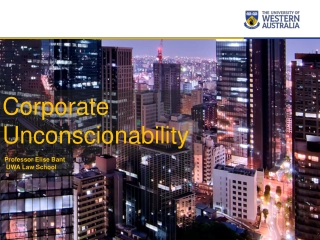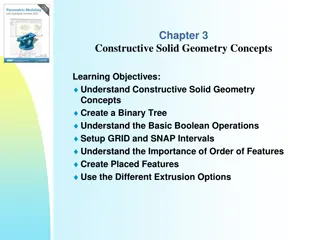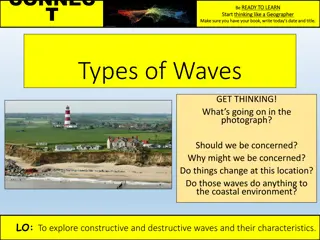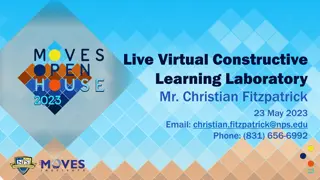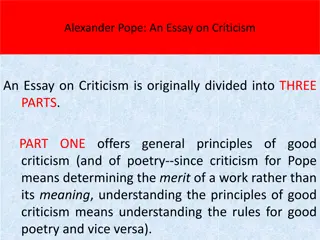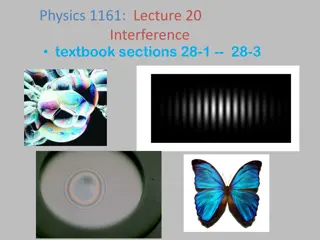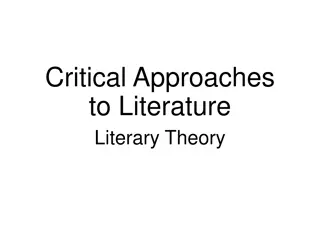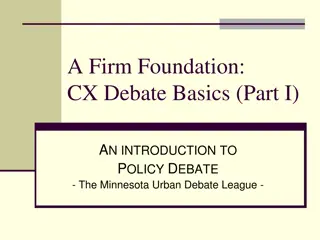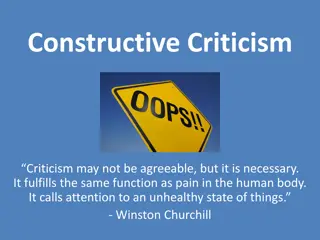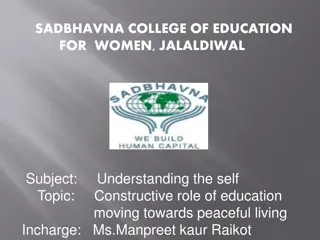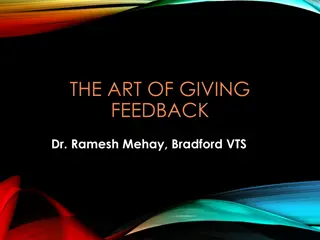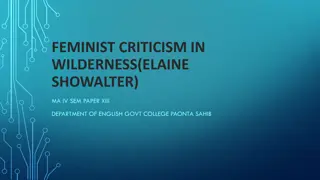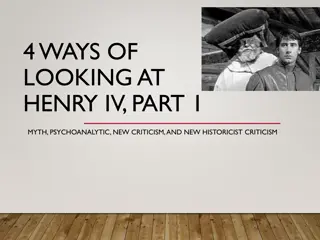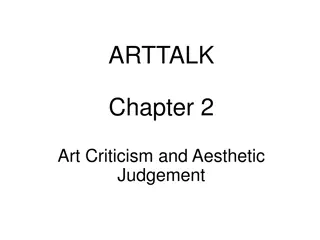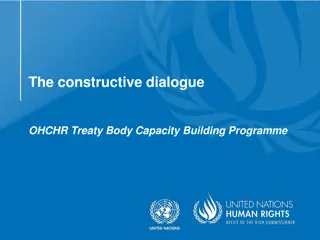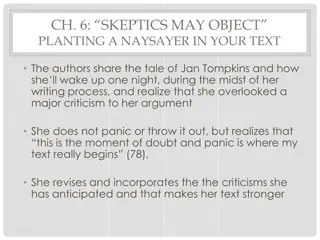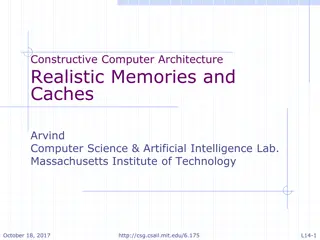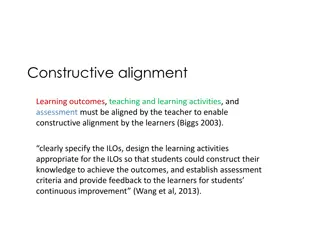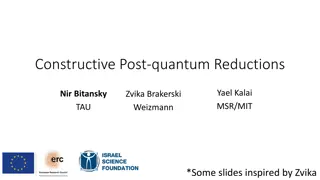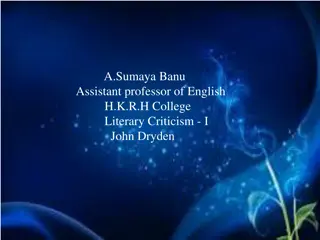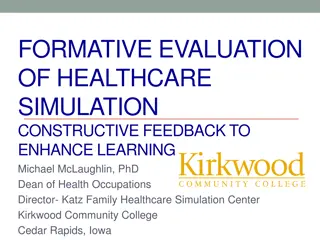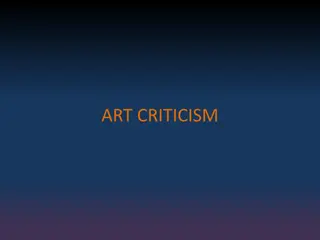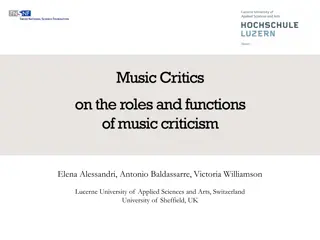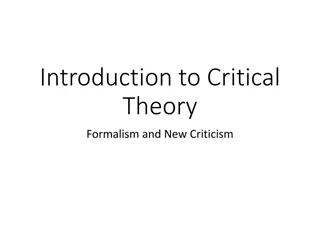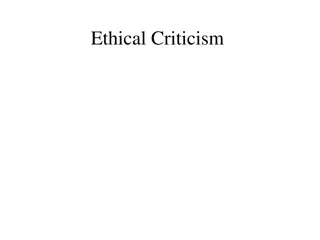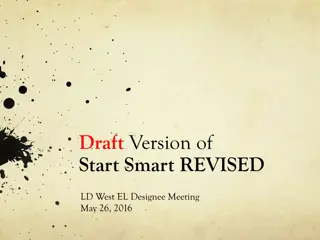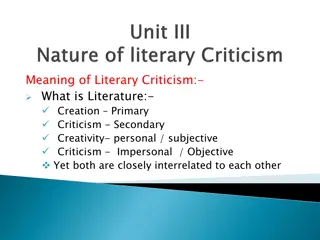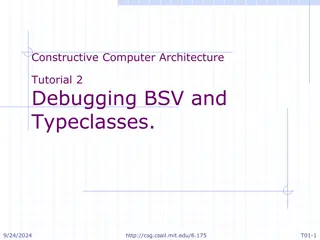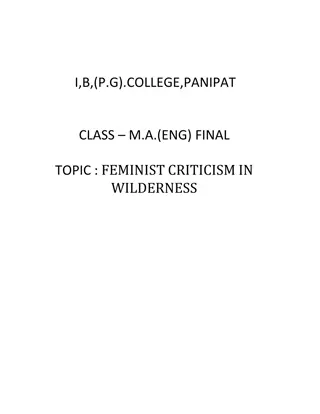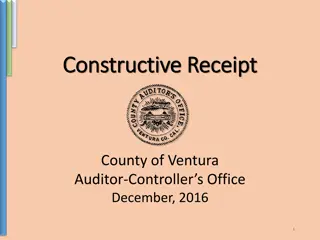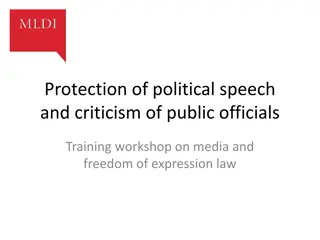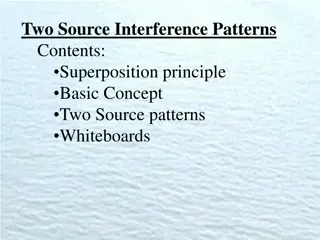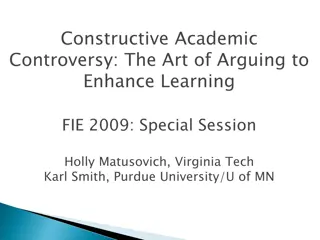Corporate Unconscionability
The concept of corporate unconscionability, including the exploitation of individuals in a special disadvantage. It explores the requirement of knowledge in cases of exploitation, such as actual knowledge, wilful blindness, recklessness, constructive knowledge, and constructive notice.
0 views • 18 slides
Empowering Students with Positive Attitudes
Discover the importance of positive attitudes among students and how teachers can promote optimism and constructive thinking. Learn how a positive mindset leads to happiness and success in life. Explore the ways positive attitude manifests and its benefits. Start each day with love and develop a con
0 views • 25 slides
Understanding Constructive Alignment in Higher Education
Constructive Alignment, introduced by John Biggs, is a foundational concept in UK higher education that focuses on aligning learning activities, assessment tasks, and intended learning outcomes within a program. By ensuring alignment, students are more likely to understand what is expected of them a
5 views • 20 slides
Understanding Constructive Solid Geometry Concepts
Explore Constructive Solid Geometry (CSG) concepts including binary tree representation, Boolean operations, base feature selection in parametric modeling, and the importance of order in feature creation. Learn about CSG's role in representing solid models and its applications in the field of solid
1 views • 13 slides
Understanding Constructive and Destructive Waves in Geographical Context
Exploring the characteristics of constructive and destructive waves in geography. Learn how waves are formed, what happens when they reach the coast, and their impact on the coastal environment. Dive into the dynamics of wave movement and the distinctions between constructive and destructive waves.
0 views • 10 slides
Naval Live, Virtual, Constructive Learning Laboratory Overview
The Naval Live, Virtual, Constructive (LVC) Learning Laboratory, led by Mr. Christian Fitzpatrick, aims to provide a platform for early-stage research and development in a synthetic environment. With a strategic vision to build the future force, the lab focuses on integrated research, test, and eval
0 views • 17 slides
Overview of Alexander Pope's "An Essay on Criticism
Alexander Pope's "An Essay on Criticism" is divided into three parts discussing the principles of good criticism, offering solutions to critical problems, and identifying obstacles to good criticism. Part One delves into the challenges critics face due to partial judgments, false learning, and envy.
0 views • 17 slides
Exploring Wave Interference in Physics: Superposition, Constructive, and Destructive Interference
Delve into the fascinating world of wave interference in physics, from understanding the concept of superposition to identifying constructive and destructive interference patterns. Discover how light waves interact through different paths and sources to create coherent or incoherent light. Explore t
0 views • 37 slides
Critical Approaches to Literature and Literary Theory
Explore different critical approaches to studying literature, including Reader-Response Criticism, Formalist Criticism, Psychological/Psychoanalytic Criticism, Sociological Criticism, and more. Dive into questions of how we read, interpret, and perceive meaning in texts, considering the impact of vi
1 views • 20 slides
An Introduction to Policy Debate: Understanding CX Debate Basics
Policy debate, also known as CX debate, involves structured arguments on policy topics. Teams of two students engage in constructive speeches and rebuttals, focusing on an annual resolution. Round structures, differences between constructive and rebuttal speeches, and debate strategies are key compo
0 views • 18 slides
Understanding Literary Criticism: A Comprehensive Overview
Literary criticism involves the study, evaluation, and interpretation of literature, focusing on themes, styles, settings, and historical contexts. This discipline explores the meanings, workings, and values of literary works through interpretation, analysis, and evaluation. Various types of literar
2 views • 20 slides
Understanding Constructive Criticism in College
Constructive criticism plays a vital role in personal growth and development. It distinguishes between constructive and destructive feedback, highlighting the intent behind criticism and its significance in college settings. Embracing feedback positively can enhance one's learning experience and aca
1 views • 13 slides
Critical Thinking in Islamic Methodology
Explore the concept of critical thinking in Islam, identifying key skills and understanding the importance of constructive criticism. Delve into the methodology of thinking in Islam that transcends superficial understanding, enabling individuals to distinguish between good and bad, correct and incor
2 views • 12 slides
Constructive Role of Education in Promoting Peaceful Living
Education plays a vital role in fostering peaceful living by promoting a constructive approach, holistic development, non-violence in classrooms, acceptance of mistakes, and positive reinforcement. This helps in creating a peaceful mindset and environment that contributes to the inner and outer grow
0 views • 10 slides
Mastering the Art of Giving Feedback
Learn the importance of feedback, how to provide it effectively, and why it is crucial for personal and professional development. Explore the positive impact feedback can have on performance, motivation, self-awareness, and insights. Discover practical tips on giving constructive criticism and creat
1 views • 39 slides
Feminist Criticism in the Wilderness by Elaine Showalter - Analysis
Elaine Showalter's essay "Feminist Criticism in the Wilderness" delves into the realm of feminist literary critique, addressing the diversity among women writers and emphasizing the importance of considering factors beyond gender. Showalter highlights the challenges and goals of feminist criticism w
0 views • 13 slides
Exploring Different Perspectives on Henry IV, Part 1 Through Myth, Psychoanalytic, New Criticism, and New Historicist Criticism
Delve into various critical lenses such as myth, psychoanalytic, New Criticism, and New Historicist Criticism to analyze Henry IV, Part 1. Uncover the mythic origins of characters like Falstaff, connections to ancient rituals, and the symbolism of killing the king. Discover how literature intertwine
4 views • 26 slides
Understanding Art Criticism and Aesthetic Judgement
Explore the world of art criticism and aesthetic judgement in Chapter 2 of ARTTALK. Discover the purpose of art criticism, learn to critique art, and understand aesthetic theories. Dive into the realm of professional critics, criteria for judgement, and the importance of forming your own opinions in
0 views • 38 slides
Understanding the Constructive Dialogue in Human Rights Context
The constructive dialogue is a key component of the OHCHR Treaty Body Capacity Building Programme, assisting treaty bodies in comprehensively assessing the human rights situation of a state party. This process involves various stakeholders, including state delegations and treaty body members, in str
1 views • 9 slides
Embracing Criticism: Strengthening Your Text Through Anticipating Objections
Authors in chapter 6 discuss the importance of incorporating criticisms into your writing to strengthen your arguments. They share Jan Tompkins' experience of overcoming doubts and incorporating anticipated objections to enhance the text's credibility. By acknowledging and addressing naysayers, writ
1 views • 12 slides
Constructive Computer Architecture Realistic Memories and Caches
Explore the realm of constructive computer architecture, realistic memories, and cache systems as presented by the Computer Science & Artificial Intelligence Lab at Massachusetts Institute of Technology. Delve into topics like 2-stage pipeline, magic memory models, and memory system views to gain in
0 views • 20 slides
Exploring Critical Theory Through Literary Criticism and Analogy
Delve into the realm of critical theory through literary criticism, using the analogy of different perspectives on seeing an orange to understand the various facets of analysis like reader response, Marxist/social power, feminist/gender, and psychoanalytic criticism. Discover how critical theory hel
0 views • 9 slides
Constructive Alignment in Teaching and Learning: A Comprehensive Guide
Constructive alignment emphasizes the importance of aligning learning outcomes, teaching activities, and assessments to enhance student learning. By clearly specifying learning outcomes, designing appropriate activities, and establishing assessment criteria with feedback, educators can foster constr
0 views • 6 slides
Exploring Post-Quantum Cryptography and Constructive Reductions
Delve into the realm of post-quantum cryptography through an insightful journey of constructive reductions, rethinking cryptography assumptions, and the relationship between classical and post-quantum regimes. Discover the challenges, advancements, and goals in the quest for durable cryptographic al
1 views • 21 slides
John Dryden's Literary Criticism and Works
A look into the literary criticism and works of John Dryden, focusing on his formal treatises, advocacy of the heroic couplet, defense of rhymed couplets in tragedy, and discussions on poetry and painting. Dryden's writings encompass a variety of genres and styles, from dramatic criticism to epic po
0 views • 23 slides
Matthew Arnold's Impact on Literary Criticism and Poetry Evaluation
Matthew Arnold, a prominent Victorian poet and critic, revolutionized literary criticism by emphasizing the importance of knowing and promoting the best ideas in the world through critical evaluation. He introduced scientific objectivity to criticism and influenced a generation of critics. Arnold sa
0 views • 25 slides
Enhancing Healthcare Simulation Through Constructive Feedback
Explore the principles and benefits of healthcare simulation, focusing on formative evaluation and constructive feedback to improve learning outcomes. Delve into the role of formative assessment tools, TeamSTEPPS model, and Mayo High Performance Teamwork Scale in simulation scenarios. Discover the s
0 views • 37 slides
Understanding Art Criticism: A Comprehensive Guide
Delve into the realm of art criticism to grasp the essence of responding to, interpreting, and making critical judgments about artworks. Explore the steps of art criticism, from description to judgment, and learn how to analyze artworks in terms of elements and principles of art and design.
0 views • 17 slides
Roles and Functions of Music Criticism: Insights from Researchers
Exploring the various aspects of music criticism, this study delves into the role of critics in evaluating music performance, their criteria for assessment, and the impact of their reviews. Researchers interviewed English and German-speaking critics to gain insights into their perspectives and pract
0 views • 20 slides
Understanding Literary Criticism: Formalism and New Criticism
Literary critics analyze and interpret works of literature, delving into social and historical contexts. They focus on techniques, themes, and cross-disciplinary exploration. Formalism, a critical lens, emphasizes internal elements of a text over external influences, seeking universal meanings expre
0 views • 11 slides
Exploring Ethical Criticism and Literature's Human Possibilities
Ethical criticism in literary studies revolves around the intersection of ethics, literature, and criticism. It tackles concerns about the relationship between value judgments, ethics, and aesthetics, emphasizing the importance of reconnecting criticism with moral principles. Literature offers a dee
0 views • 21 slides
Start Smart Revised: Constructive Conversation Skills Workshop
Dive into the revised version of Start Smart to enhance students' Constructive Conversation skills through collaborative activities and discussions. Explore the differences between the original and revised lessons, share valuable insights, and provide feedback for continuous improvement.
1 views • 9 slides
An Overview of Debate: Propositions, Teams, and Formats
Debate is a regulated discussion between two matched sides discussing a proposition, with the affirmative arguing for change and the negative defending the status quo. The standard debate format involves constructive arguments followed by rebuttals from both sides. The roles in a debate include the
0 views • 47 slides
Understanding Literary Criticism: Exploring the Art of Interpreting and Evaluating Literature
Literary criticism, rooted in ancient Greek and Roman traditions, involves interpreting, analyzing, and evaluating literary works. It has evolved over time, encompassing various theories and approaches to engage with literature critically. From mimetic theory to analytical criticism, different persp
0 views • 11 slides
Debugging Techniques in Constructive Computer Architecture
Explore debugging methods in constructive computer architecture tutorial sessions, focusing on debugging BSV code, typeclasses, and functional style. Learn how to use print and display statements effectively, handle conflicts, and identify and fix common bugs. Dive into the significance of ways to d
0 views • 40 slides
Feminist Criticism in Wilderness: Analyzing Elaine Showalter's Essay
The essay by Elaine Showalter delves into feminist literary criticism, exploring its aims, challenges, and the perception of being in "wilderness." Showalter discusses the evolution of feminist criticism, the need for a solid theoretical framework, and the hurdles faced by feminist critics. She emph
0 views • 14 slides
Understanding Constructive Receipt in Taxation
The doctrine of constructive receipt in taxation dictates that income, even if not physically received, is taxable when made available to the taxpayer. This principle applies to various scenarios such as interest credited to accounts and compensation for services rendered. Failure to recognize const
0 views • 19 slides
Protection of Political Speech and Criticism: Ensuring Freedom of Expression for Public Officials
Understanding the importance of freedom of speech in political discourse, this workshop focuses on the legal framework protecting political speech and criticism of public officials. Highlighting the rights and responsibilities in democratic societies, the content emphasizes the necessity of open deb
0 views • 14 slides
Understanding Two-Source Interference Patterns
Dive into the fascinating world of two-source interference patterns with the superposition principle, constructive and destructive interference concepts, and demonstrations illustrating how overlapping waves interact. Explore scenarios like people talking simultaneously and ripples on a pond to gras
0 views • 31 slides
Enhancing Learning Through Constructive Academic Controversy
Constructive Academic Controversy (CAC) is an educational approach combining cooperative learning with structured intellectual conflict to stimulate problem-solving and reasoned judgment. This methodology helps students develop teamwork, communication, and conflict resolution skills essential for en
0 views • 17 slides
